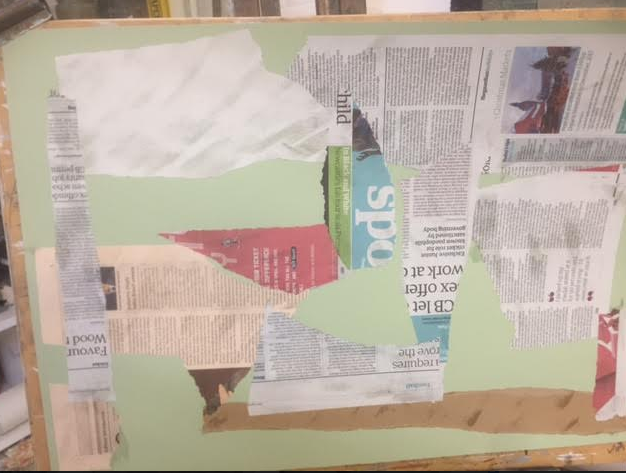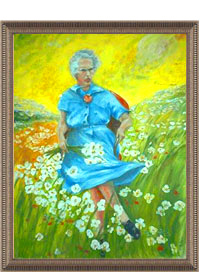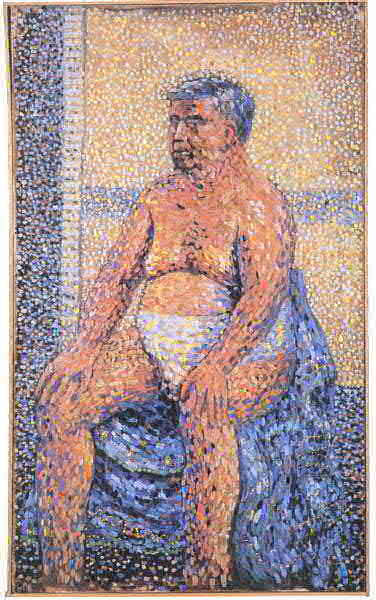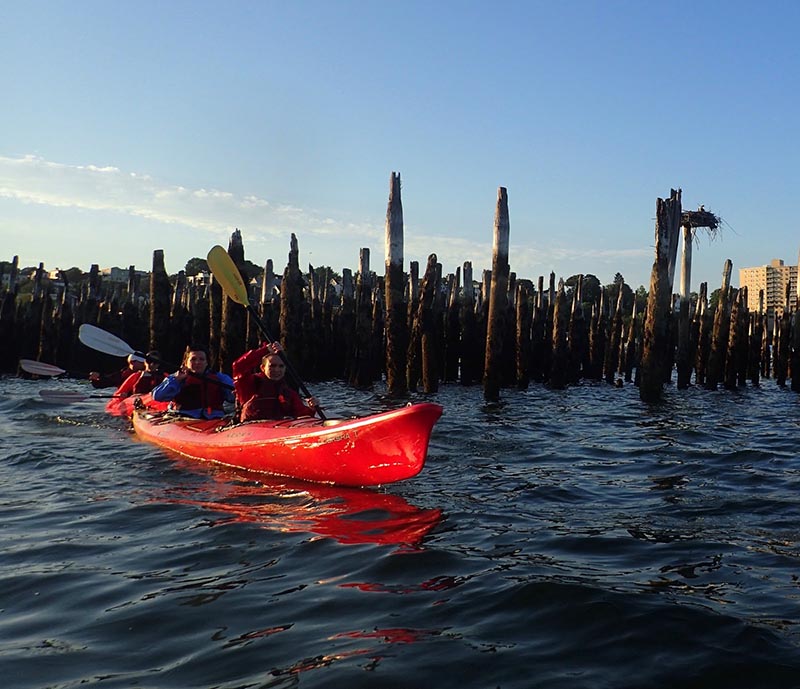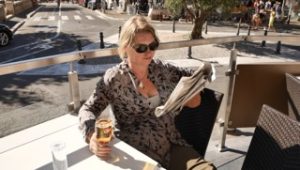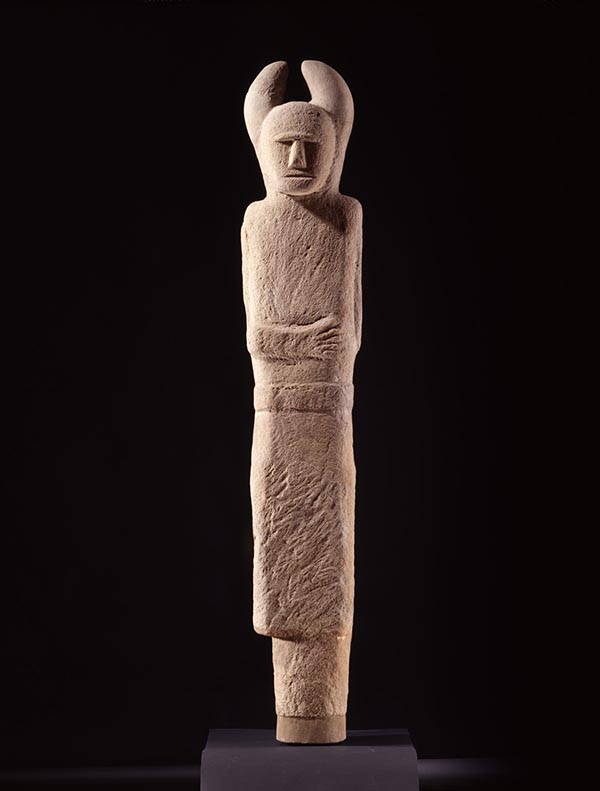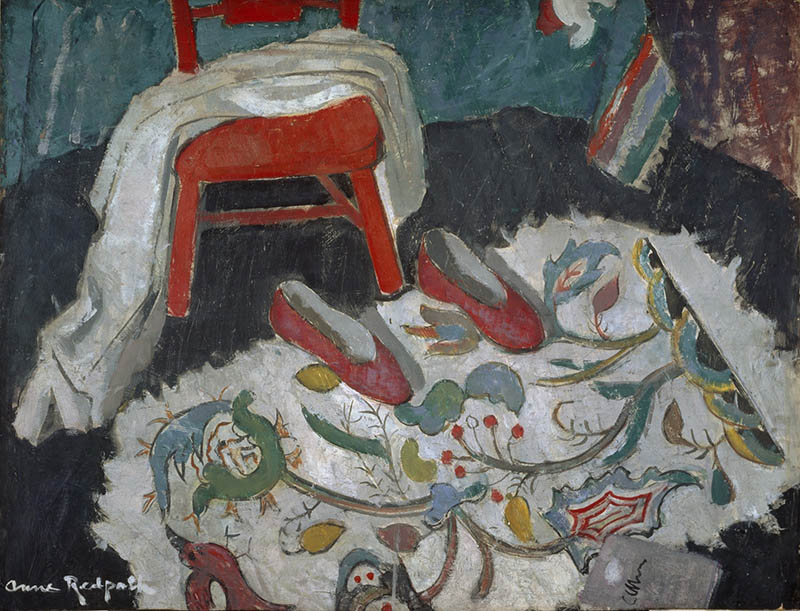Articles
Lament for Eilidh MacLeod
Back in Scotland, on a visit to a friend in her 70s, She talked about two girls from Barra Who were caught up in the Manchester bombing She thought of…
Finding Art in the News.
Real newspapers can be used for many things that their digital counterparts never could – from lining the veg box to making paper boats and beyond. Artist Jane Couroussopoulos finds a novel use for the pile of old Guardians she keeps in her studio, turning them into works of art.
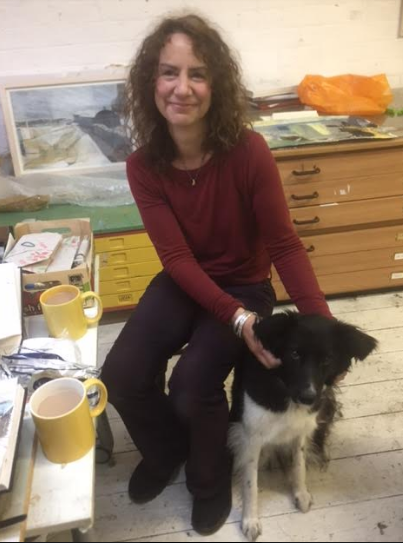
Jane and Poppy in the studio.
How Le Monde Sees Brexit and the Scottish Referendum
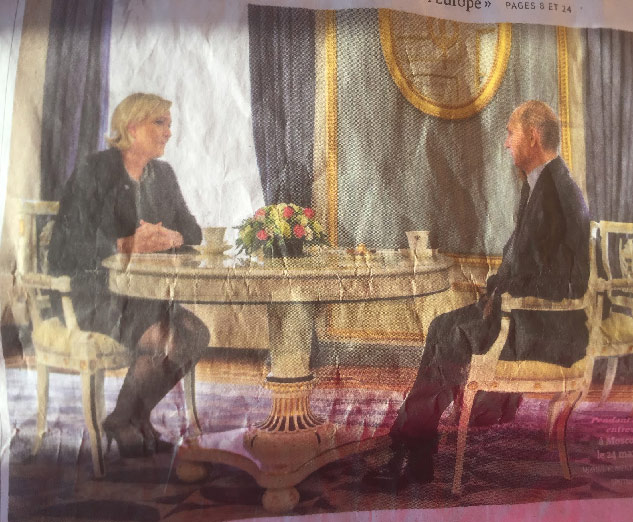
The week that ‘Article 30’ was triggered by Nicola Sturgeon and ‘Article 50’ was triggered by Theresa May’s letter, I was in France and over a cafe creme each morning, read about it all in Le Monde. This great European newspaper with its painstaking reportage and thoughtful opinion; sophisticated use of photography, and broad agenda of international news, illuminated the situation and it is always interesting to see oursels as ithers see us, as the poet said.
At their meeting in Glasgow, May said to Sturgeon about the referendum call: “Ce n’est pas le bon moment.” Some things just sound better in French. In English her: “Now is not the time,” has a rather nanny-ish ring, it’s one of those circular phrases that May likes. I can imagine a character saying this in Alice In Wonderland and the White Rabbit replying, irritated, looking at his watch: “The time is always now, don’t you know anything?” But “Ce n’est pas le bon moment,” sounds faintly desperate. It reminds me of the Jacques Brel classic “Ne me quitte pas,” with its lines “Oublier le temps..et le temps perdu” (Forget the time and the time that’s past). This song, of course, would also do as a soundtrack for Brexit.
May v Sturgeon: Scottish Education Swept up in Political War of Words
By Jackie Kemp, Published in the Guardian, March 21, 2017.
From James Watt’s steam engine to Dolly the sheep, Scotland is proud of its strong science tradition, so a recent fall in the international rankings of Scottish pupils in science is causing a degree of national soul-searching.
Children tell the Scottish Cabinet what they want.

Children’s Parliament Imagineers show off their mural.
On a recent afternoon, as a weak Spring sun shone over Edinburgh’s Charlotte Square picking out crocuses in the square’s central garden, the door of Bute House – official residence of Scotland’s First Minister – opened and a group emerged from a lengthy consultation with the Scottish Cabinet. They huddled together on the steps, reporting to an accompanying cameraman about the event. But as they did so they began to hop around and skip up and down the steps in a manner most unusual for the dignitaries who generally emerge from discussing affairs of state there.
These delegates were all primary school children – a small group from the Children’s Parliament (CP) which had come to talk to Nicola Sturgeon and Education Minister John Swinney, as well as other members of the Cabinet and Scottish Government officials about what is important to children in Scotland today.
Bookshops of Boston 1: Commonwealth Books
Leo perusing the shelves of Commonwealth Books
Will bookshops survive the digital revolution? Perhaps some of them may. There is a special pleasure in reading on paper, browsing real books, picking them up and gathering in a moment a sense of their heft and gravitas. This January, among other things, I plan to read more, and to read more weirdly and widely, rambling without the direction or the cognisance of algorithms.
So on a snowy Sunday afternoon shopping for dull household items in Boston’s January sales, my feet turned as they often do towards the alley that houses Commonwealth Books. It’s a fascinating second-hand bookstore which is also the residence of a large ginger cat named Leo. Leo reminds me of a real-life version of the fictional ‘Bagpuss’, a shop-dwelling cloth cat whose magical adventure were narrated by Oliver Postgate on the BBC when I was a child.
A personal memoir of US election night, 2016
That November night in 2016 when Trump was elected – a recollection.
Two Exhibitions: “Doppelhanger” at MOBA and “Frances Stark” at MFA
I laughed more in my short visit to the Museum of Bad Art (MOBA) – than I can remember doing at an art gallery. But the experience was not only amusing; it helped me to reflect upon the curatorial process at work in all art galleries, and to reach a conclusion about the Frances Stark retrospective which is currently on show at Boston’s Museum of Fine Art.
The current MOBA exhibition is entitled “doppelhanger” and features portraits which bear an intended or accidental resemblance to a famous person. My guide, Louise Reilly, pointed to “Sunday on the Pot with George” (above).
“This is one of my all time favorites. Pointillism is difficult. Why would anyone expend that much energy painting a middle-aged man in his tighty whities sitting on a toilet?” And look” she pointed to where the portrait ends, at the subject’s ankles, where either by accident or design the painter has avoided having to include those challenging feet.
Two Exhiitions: “Doppelhanger” at MOBA and “Frances Stark” at MOFA
I laughed more in my short visit to the Museum of Bad Art (MOBA) – than I can remember doing at an art gallery. But the experience was not only amusing; it helped me to reflect upon the curatorial process at work in all art galleries, and to reach a conclusion about the Frances Stark retrospective which is currently on show at Boston’s Museum of Fine Art. The current MOBA exhibition is entitled “doppelhanger” and features portraits which bear an intended or accidental resemblance to a famous person. My guide, Louise Reilly, pointed to “Sunday on the Pot with George” (above). This is one of my all time favorites. Pointillism is difficult. Why would anyone expend that much energy painting a middle-aged man in his tighty whities sitting on a toilet?” And look” she pointed to where the portrait ends, at the subject’s ankles, where either by accident or design the painter has avoided having to include those challenging feet.
Mysteries are a Great Way of Getting to Know a City
Boston. Photo by Rob Bruce
Exploring the city of Boston, I have enlisted the help of a private eye. A six-foot-one ass-kicking redhead who moonlights as a part-time cabbie and roams the city night and day, rooting out the corruption which constantly reappears, always in a different form.
Is Farming the New Rock and Roll?
I was prompted to ask this question after meeting some start-up farmers in Massachusetts. They are interesting and unexpected entrants into a profession we are often told has a gloomy future: from a rock promoter to a Harvard educated bio-physicist.
Like other developed countries and the rest of the US, Massachusetts has a large number of farmers over the age of 65 with no identified inheritors. For 30 years, the number of entrants into farming was on the slide. However, over the last decade that has begun to change. It seems, farming is becoming cool again.
Adventures in Boston and Portland, Maine

Jackie Kemp in Boston: Photo by Rob Bruce
“Large, hot Earl please,” the waitress yelled in a cafe this morning. I smiled, seeing in my mind’s eye a dashing peer of the realm with a twirling moustache, like a character from Blackadder, rushing out of the kitchen. But no, just a tepid tea in a paper cup. Spending time in Boston this week, where my husband is working, I have been reminded of the saying, attributed to George Bernard Shaw, that Britain and America are “two nations divided by a common language”. At the library when the attendant said: “check your bag, please,” I opened it thinking she meant she wanted to look inside. But she meant it had to be put in a locker.
I belong to Europe, by David Kyd
(To the tune of I belong to Glasgow https://www.youtube.com/watch?v=eJwl9GLaUAU) I dinna belang to the Glaekit! I belong tae Europe Europe’s affa doon Since it got a kick in the Brexit…
Is the Curriculum for Excellence Dumbing Down Scottish Education?
What do we mean by a good education? It’s not the same as being intelligent of course. An educated young person has skills they can take with them into the world. But should these include reasonable fluency in a modern language, an understanding of the sciences, maths, some knowledge of literature and history? Or, in this age of easy fact-finding on the internet does an educated person mean: a successful learner, a confident individual, a responsible citizen and an effective contributor, as Scotland’s Curriculum for Excellence has it? The Scottish government is wrestling with the implementation of this curriculum, which was intended to build on the concept of the “democratic intellect”, a generalist approach favouring interdisciplinary study. But how is it working in practice?
A Sleepless Night
I composed this poem one night when I couldn’t sleep. It was also partly inspired by hearing about an ancient method of hunting where two or three hunters with only…
Drinking, Feasting, Fighting, Wearing Bling – the Celts Come to Town
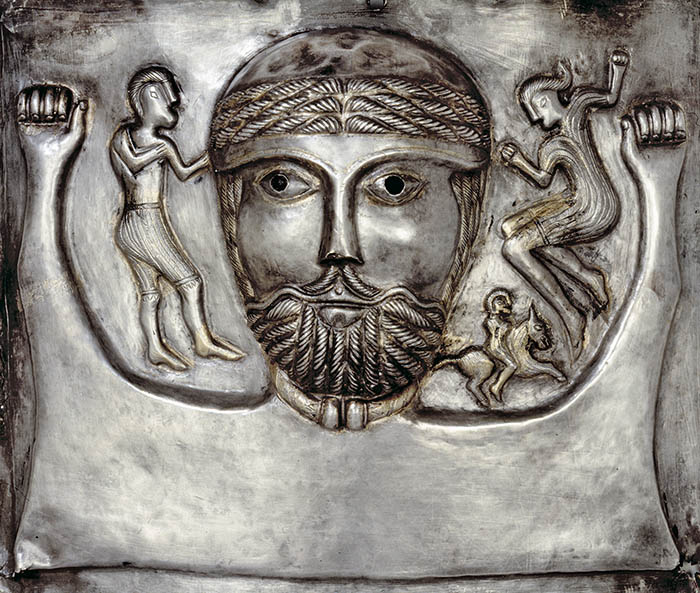
Detail from the Gundestrup Cauldron, circa 100BC, Denmark.
Images courtesy of the British Museum and the NMS
Celts could be weird and scary. They were mad for the drink and when they had it, you had to watch out for them: they saw things and became aggressive. They were radge fighters, absolutely mental, they dressed up to go into battle and they played great big war horns that made a sound that would scare the living daylights out of you. And they liked bling, loved it actually: gold, bronze, iron, glass, precious stones. They wore chunky jewellery decorated with abstract patterns and symbols. They were skilled at metalwork, leatherwork, pottery and weaving and if something precious was broken, they would mend it – a bronze flagon with a broken handle would get a different handle, or a hole would be fixed with a decorated patch, and made as good as new – better in fact. Oh and they loved parties and feasting; the women were great hosts and they were buried with their special pots and flagons, probably so they could use them for a big after-party on the other side.
Creativity and Courage: An Exhibition of Women’s Art
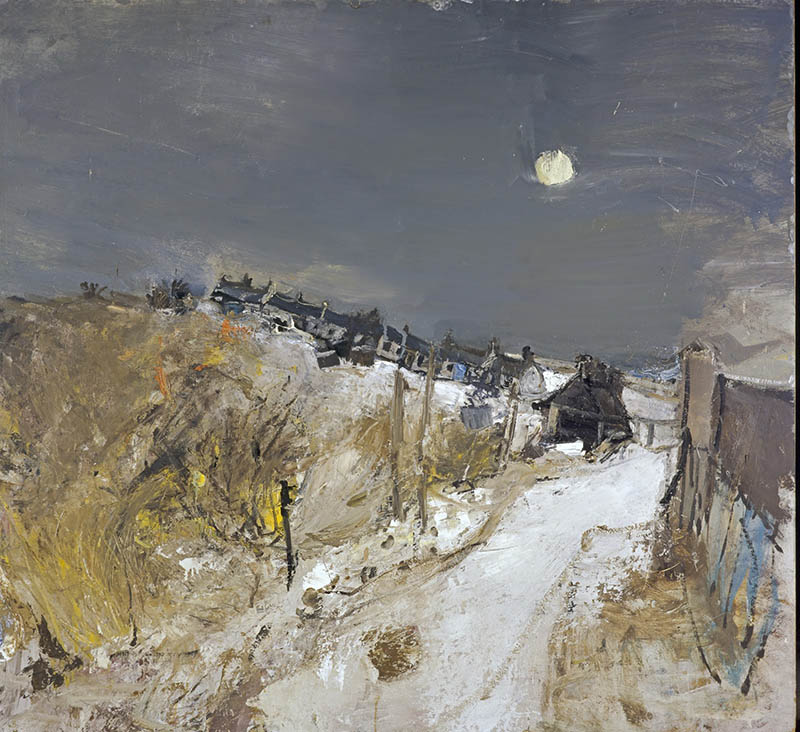
Catterline in Winter. Joan Eardley. Images Courtesy of the National Galleries of Scotland
There are many powerful pieces in the current exhibition of Modern Scottish Women’s Art from the late Victorian era to the early 60s and the show casts light on the challenges that women artist faced.
They had to contend with barriers such as the bar on married women’s employment and the misogyny which meant they were not admitted to bodies like the RSA. There was prejudice from families which made it harder to train and caring responsibilities which absorbed their time and emotional energy.
But these were strong women all of whom earned at least a partial living from their endeavours as artists and this exhibition is a rare opportunity to see their often unfairly neglected work.

